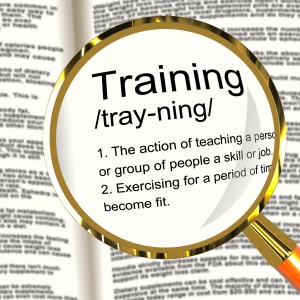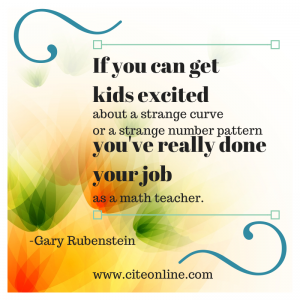Math Doesn’t Need to be Relevant
Math Doesn’t Need to be Relevant
Listen to this post!
I recently read two things that really struck me in the conversation about the practical applicability of learning. Here’s Gary Rubinstein, a math teacher in NYC describing a presentation he did at a math teacher’s conference.
“The idea was that math doesn’t always have to be ‘relevant’ in the practical sense. The main thing is that it is thought provoking.
For the hundred or so people who attended, they seemed to appreciate the message in this age where people are stressing how math lessons must be relevant to get student’s attention. I disagree.
If you can get kids excited about a strange curve, or a strange number pattern or something like that, you’ve really done your job as a math teacher.” http://garyrubinstein.wordpress.com/
The other post was by a philosophy teacher who teaches at a community college. http://www.theatlantic.com/education/archive/2014/04/plato-to-plumbers/361373/ The part I loved about the essay was this:
“There are among future plumbers as many devotees of Plato as among the future wizards of Silicon Valley, and that there are among nurses’ aides and soldiers as many important voices for our democracy as among doctors and business moguls.”
He then went on to give some great examples of non elite people who had embraced something he had taught; a factory worker reading Schopenhauer, a janitor reading Al-Ghazali, a mother who had risked a surgery for a crippled child and had the child die from the surgery thinking through the issue using Kant.
As he says “The fire will always be sparked. Are we going to fan it, or try to extinguish it?”
Philosophy is the kind of subject that is getting progressively squeezed out as more and more college students are urged to study subjects that will help them get better paying jobs. This is exactly the same mindset we see in our K-12 schools as we cut the arts and any other subject that isn’t being tested. The idea is that the only things we should be learning are the things that are going to get us ahead in [our financial] life. My Bachelor’s thesis had the pretentious title of “Human and Anti-human in the Critique of Dialectical Reason.” I’ve never applied my study of Jean Paul Sartre to any practical question.
But what’s going to get us ahead in life isn’t always so obvious.
I have been blessed as a business owner to have had a liberal arts education. Here’s what I wrote to a university administrator a few years ago who didn’t know of my support for Liberal Arts.
 I was taught to read generously and critically. My education emphasized both a nose for truth, but also a spirit of collegiality and what is now called win-win thinking. It was never enough for us to merely tear down an argument; we were required to buttress the writer’s view because we assumed that he or she had something worthwhile to say, or we wouldn’t be reading them. In an era where too many businesses operate from a win-lose zero sum perspective, the sympathy with which I was taught to read helps CITE work with partners.
I was taught to read generously and critically. My education emphasized both a nose for truth, but also a spirit of collegiality and what is now called win-win thinking. It was never enough for us to merely tear down an argument; we were required to buttress the writer’s view because we assumed that he or she had something worthwhile to say, or we wouldn’t be reading them. In an era where too many businesses operate from a win-lose zero sum perspective, the sympathy with which I was taught to read helps CITE work with partners.
We are dedicated to the idea that our business has to work for everyone—our students, our partners and CITE.
I was taught to ask questions, and not assume I knew everything. At this level of leadership, it is really dangerous to think that I know everything about our customers, about marketing etc. I evaluate my opinions about things all the time by asking people at CITE who have more direct knowledge of a given situation.
I was taught a certain modesty. I attended an elite institution, and I certainly have a tendency to be an arrogant snob. But, at least for me, it’s hard to read Hegel, Marx, Freud, Durkheim, Gadamer etc and not think there are at least a few people in the world who have thought long and hard about subjects that captured my interest, and might have something intelligent to say about them. Every time someone rolls out the next great thing in education, I’m reminded of that modesty and the likelihood that the next great thing might not be so great.
It’s hard to develop that skill if you think education is all about mastering a certain set of knowledge (much of which will be obsolete anyway in 5 years) so you can get a job.
We make a terrible and stupid mistake to think that we know everything someone should learn. We make a terrible and stupid mistake to try to fit everyone into some small box, a box which doesn’t tend to have much connection with the skills we need to thrive in the real world. We make a terrible and stupid mistake to think cognition is everything.
We make a terrible and stupid mistake to limit our education to what can be tested.
Jared Gellert is the executive director for the Center for Integrated Training and Education in NYC. CITE trains teachers, administrators, and counselors in NYC and Long Island (including Suffolk!).
IF YOU FOUND THIS INTERESTING, PLEASE SHARE!






